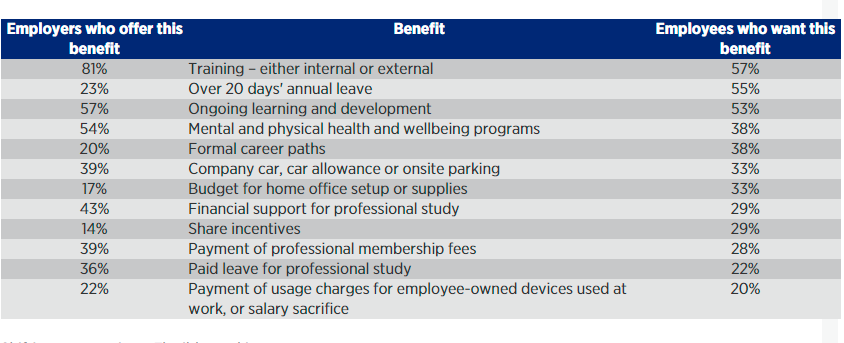Just 33 per cent of Australian employees are satisfied with their current benefits, according to recruiting experts Hays. This follows news that while wages are in fact increasing, it is not to the employees’ expectations and that their performance and the demand for their skills merits more.
According to Hays, benefits can bridge this divide. “With a salary expectation gap evident, offering the benefits employees value can help reward and retain top talent in a competitive labour market,” says Nick Deligiannis, Managing Director of Hays in Australia & New Zealand.
Benefits also aid staff attraction. According to the Hays Salary Guide 22/23, over one-third (35%) of employers have improved benefits and working practices to entice more staff.
Employee priority: Over 20 days’ annual leave
Hays’s data shows the provision of more than 20 days’ annual leave has soared up the list of desired employee benefits, sought by 55 per cent of jobseekers compared to 30-year one year prior. It now sits behind only training (sought by 57%) as employees’ most valued benefit.
However, while 81 per cent of employers offer training, only 23 per cent provide more than the minimum legal requirement of annual leave. “The pandemic prompted many people to prioritise their work-life balance and mental health,” says Nick. “To care for their health and wellbeing they now want a job that offers more than customary annual leave.
“The pandemic prompted many people to prioritise their work-life balance and mental health,” says Nick. “To care for their health and wellbeing they now want a job that offers more than customary annual leave.
“If a person’s time is as valuable as money, additional annual leave can add significantly to their overall package.”
Rounding out the top five benefits sought are ongoing learning & development (53%), mental and physical health and wellbeing programs (38%) and formal career paths (also 38%).
Interestingly, flexile working is not on the list. Apparently, it has gone from the list of ‘benefits’, instead now expected to be the norm.
“For jobs that can be performed outside a central workplace, skilled professionals expect to work in a hybrid arrangement,” Nick said. “After more than two years of hybrid working, it’s no longer considered a benefit that can attract and engage staff but rather a minimum ordinary entitlement.”




















